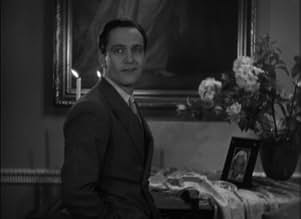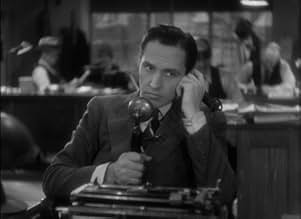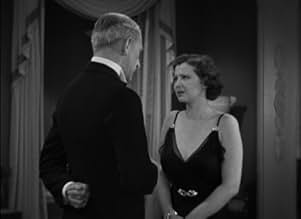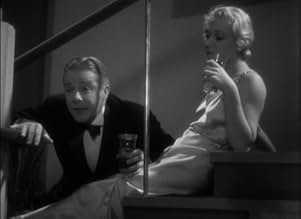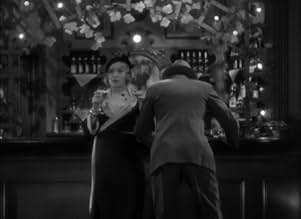IMDb-BEWERTUNG
6,9/10
2208
IHRE BEWERTUNG
Füge eine Handlung in deiner Sprache hinzuA drunken newspaperman is rescued from his alcoholic haze by an heiress whose love sobers him up and encourages him to write a play, but he lapses back into dipsomania.A drunken newspaperman is rescued from his alcoholic haze by an heiress whose love sobers him up and encourages him to write a play, but he lapses back into dipsomania.A drunken newspaperman is rescued from his alcoholic haze by an heiress whose love sobers him up and encourages him to write a play, but he lapses back into dipsomania.
- Regie
- Drehbuch
- Hauptbesetzung
- Auszeichnungen
- 3 wins total
Richard 'Skeets' Gallagher
- Buck
- (as Skeets Gallagher)
Ernie Adams
- Reporter
- (Nicht genannt)
Mildred Boyd
- June
- (Nicht genannt)
Edna Callahan
- Bridesmaid
- (Nicht genannt)
Leonard Carey
- Prentice's Butler
- (Nicht genannt)
Harry Cording
- Fred
- (Nicht genannt)
Milla Davenport
- Prentice's Housekeeper
- (Nicht genannt)
Empfohlene Bewertungen
Clever dialogue, fantastic acting, and several great scenes made this film a delight for me, but be forewarned, its main character may have you saying 'grrr', and reduce your enjoyment. Frederic March plays a newspaper reporter / playwright who has a drinking problem, and it's while he's drunk at a party that he meets a charming young lady, played by Sylvia Sidney. The two hit it off and despite the concerns of her rich father (George Irving), get married. Things get complicated when his ex-lover (Adrianne Allen) re-surfaces and he struggles to control his problem.
It's a very strong cast all around, and Sidney in particular turns in a great performance. She ranges from a sweet, naïve, and trusting soul, loving unconditionally, to hurt and confused, to woman whose solution is to give her husband a taste of his own medicine, in a rather shocking development. The scene with her partying with her own young lover (Cary Grant no less) and his friends and quipping "Gentlemen, I give you the holy state of matrimony, modern style: single lives, twin beds and triple bromides in the morning" is sad, empowering, and a little thrilling all at the same time. As they're in a bar that's practically a den of iniquity, it's all clearly pre-code, but there is an intelligence and honesty in this scene, and throughout the movie.
March is also strong as this affable but flawed man, and in early scenes we smile at his partying, at one point yelling "Is there a baritone in the house?" until he finds a barman to fill out a quartet with his friends so that they can break out in song. The warning signs are there in his tardiness and even at his wedding, as he and his best man (Skeets Gallagher) fumble for the ring, which he's forgotten. That scene is one of several that are well directed by Dorothy Arzner, as she cuts to guests making observations and the facial reactions of March and Sidney as they say their vows.
There is a lot of partying and revelry which may put some viewers off, but I found that allowed for some fantastic moments. In one, March asks Sidney to shut the door and hold him back from going to the other woman, and in a strong way she opens it wide and says "I'm no jailer - get out!" In another, as March and Allen 'play-act' a passionate kiss to the merriment of others right in front of her, we feel the shock and humiliation amplified by her brilliant facial reaction.
The title is clearly meant to titillate, but the film has real substance beneath. It's wild, but also realistic, though I didn't care too much for the ending. We see what destructive behavior leads to, and in that I suppose there is a message, but it's delivered without heavy-handed moralizing. The plot is a tad melodramatic, but it's daring and unique in the areas it explores. Well worth checking out, if you're in the mood for pre-code.
It's a very strong cast all around, and Sidney in particular turns in a great performance. She ranges from a sweet, naïve, and trusting soul, loving unconditionally, to hurt and confused, to woman whose solution is to give her husband a taste of his own medicine, in a rather shocking development. The scene with her partying with her own young lover (Cary Grant no less) and his friends and quipping "Gentlemen, I give you the holy state of matrimony, modern style: single lives, twin beds and triple bromides in the morning" is sad, empowering, and a little thrilling all at the same time. As they're in a bar that's practically a den of iniquity, it's all clearly pre-code, but there is an intelligence and honesty in this scene, and throughout the movie.
March is also strong as this affable but flawed man, and in early scenes we smile at his partying, at one point yelling "Is there a baritone in the house?" until he finds a barman to fill out a quartet with his friends so that they can break out in song. The warning signs are there in his tardiness and even at his wedding, as he and his best man (Skeets Gallagher) fumble for the ring, which he's forgotten. That scene is one of several that are well directed by Dorothy Arzner, as she cuts to guests making observations and the facial reactions of March and Sidney as they say their vows.
There is a lot of partying and revelry which may put some viewers off, but I found that allowed for some fantastic moments. In one, March asks Sidney to shut the door and hold him back from going to the other woman, and in a strong way she opens it wide and says "I'm no jailer - get out!" In another, as March and Allen 'play-act' a passionate kiss to the merriment of others right in front of her, we feel the shock and humiliation amplified by her brilliant facial reaction.
The title is clearly meant to titillate, but the film has real substance beneath. It's wild, but also realistic, though I didn't care too much for the ending. We see what destructive behavior leads to, and in that I suppose there is a message, but it's delivered without heavy-handed moralizing. The plot is a tad melodramatic, but it's daring and unique in the areas it explores. Well worth checking out, if you're in the mood for pre-code.
Some time ago I became the owner of the Pre-Code Hollywood Collection. Me was told to watch first Merrily We Go To Hell (1932), one of the six films within this collection. And really I can say... it is a gem on its own. Maybe because it is the first film I've seen from director Dorothy Arzner and the second film I've seen with Sylvia Sidney, I got besmitten from the start seeing her in Sabotage (1936), but I was taken away with the whole as a combination of acting, directing, the story and some gowns.
Fredric March is awesome playing the drunk man, and later husband, just right and not lost in overacting. The parties go on and on. The marriage is more the real thing and not the Hollywood marriage after the Production Code came about. It is nice to see a young Cary Grant, in his first year of acting. Later that year he would have his breakthrough I think I can say fairly with Blonde Venus.
All along the storyline I wondered what the movie is trying to tell us. There are a few good aspects told about how relations can be. First the character of Mrs. Sidney, Joan Prentice, is that of a woman in love and want to do everything for her man, even let him go towards another woman. The next stage is trying to win him back by jealousy and then, the last stage, leaving her husband for good. And you can say in Hollywood in those days they also want an happy ending, but... Sorry, I won't go into spoilers. I didn't expected it, but a real good movie to watch.
Fredric March is awesome playing the drunk man, and later husband, just right and not lost in overacting. The parties go on and on. The marriage is more the real thing and not the Hollywood marriage after the Production Code came about. It is nice to see a young Cary Grant, in his first year of acting. Later that year he would have his breakthrough I think I can say fairly with Blonde Venus.
All along the storyline I wondered what the movie is trying to tell us. There are a few good aspects told about how relations can be. First the character of Mrs. Sidney, Joan Prentice, is that of a woman in love and want to do everything for her man, even let him go towards another woman. The next stage is trying to win him back by jealousy and then, the last stage, leaving her husband for good. And you can say in Hollywood in those days they also want an happy ending, but... Sorry, I won't go into spoilers. I didn't expected it, but a real good movie to watch.
Cleo Lucas wrote 'I, Jerry, take thee Joan', her only novel, at the tender age of twenty-four and it has been adapted by Edwin Justus Mayer for Paramount whilst marking the last film directed for that studio by Dorothy Arzner before going freelance.
Early on in the film the newly engaged Jerry of Fredric March asks: "Have I a right to take a swell girl and make her a wife?" Thus setting the scene for another of Ms. Arzner's stealthy critiques of the married state.
As expected, her direction is impeccable, her editing seamless and the magnificent performances she has drawn from her two leading players makes this emotional rollercoaster riveting viewing.
The all-important chemistry between March and the enchanting Sylvia Sidney as Joan without which the film would not work, is palpable from the outset. Her character develops and grows in strength as the film progresses whilst in his fourth film for this director, his portrayal of a tragic drunk makes him perfect casting for the role of Norman Maine five years later. Classy English actress Adrianne Allen is Jerry's old flame whose reappearance spells disaster.
Ambivalence runs through Ms. Arzner's oeuvre, never more so than in the ending here which is both happy and deeply tragic.
Early on in the film the newly engaged Jerry of Fredric March asks: "Have I a right to take a swell girl and make her a wife?" Thus setting the scene for another of Ms. Arzner's stealthy critiques of the married state.
As expected, her direction is impeccable, her editing seamless and the magnificent performances she has drawn from her two leading players makes this emotional rollercoaster riveting viewing.
The all-important chemistry between March and the enchanting Sylvia Sidney as Joan without which the film would not work, is palpable from the outset. Her character develops and grows in strength as the film progresses whilst in his fourth film for this director, his portrayal of a tragic drunk makes him perfect casting for the role of Norman Maine five years later. Classy English actress Adrianne Allen is Jerry's old flame whose reappearance spells disaster.
Ambivalence runs through Ms. Arzner's oeuvre, never more so than in the ending here which is both happy and deeply tragic.
Everybody here is terrific, and Paramount brought out its A-list stars for the leads, Sylvia Sidney as heiress Joan Prentice and Fredric March as aspiring playwright Jerry Corbett. They are a young couple who marry in spite of the fact that Jerry is an alcoholic who is still stuck on a past heartbreak, stage actress Claire Hempstead.
The plot treads a conventional path full of precode tropes - infidelity, drunkenness, open marriage, the inconvenient pregnancy, and the wealthy family of one spouse distrusting the not so wealthy other spouse and his motives. But yet it is interesting because of several - "Wow did they do that back then?" moments.
For example - Jerry works at a newspaper. When somebody makes an insulting remark about his upcoming wedding, Jerry punches him in the throat. And yet nobody gets fired or arrested. Prohibition is still in force, and everybody drinks everywhere. Nobody even bothers with the discretion of a flask. There is booze at private parties, booze in public places, booze everywhere. When a turkey gets accidentally dropped on the floor, the alternative is... canned chicken??? Ugh. I would think the couple didn't want to have me over for dinner in the first place. Then there is Jerry's hit play up in lights - "When Women Say No - a satirical comedy". Yikes!
Need I mention that the art design and Sylvia Sidney's fashions are gorgeous. With Skeets Gallagher as Jerry's best friend, the great Esther Howard who seems to be in some kind of relationship with Skeets' character and had a marriage end because of her former husband's drinking - she's always memorable, and Cary Grant as one of Joan's extramarital escorts with what seems to be his original nose.
The plot treads a conventional path full of precode tropes - infidelity, drunkenness, open marriage, the inconvenient pregnancy, and the wealthy family of one spouse distrusting the not so wealthy other spouse and his motives. But yet it is interesting because of several - "Wow did they do that back then?" moments.
For example - Jerry works at a newspaper. When somebody makes an insulting remark about his upcoming wedding, Jerry punches him in the throat. And yet nobody gets fired or arrested. Prohibition is still in force, and everybody drinks everywhere. Nobody even bothers with the discretion of a flask. There is booze at private parties, booze in public places, booze everywhere. When a turkey gets accidentally dropped on the floor, the alternative is... canned chicken??? Ugh. I would think the couple didn't want to have me over for dinner in the first place. Then there is Jerry's hit play up in lights - "When Women Say No - a satirical comedy". Yikes!
Need I mention that the art design and Sylvia Sidney's fashions are gorgeous. With Skeets Gallagher as Jerry's best friend, the great Esther Howard who seems to be in some kind of relationship with Skeets' character and had a marriage end because of her former husband's drinking - she's always memorable, and Cary Grant as one of Joan's extramarital escorts with what seems to be his original nose.
A wonderful and unsettling pre-Code film about an alcoholic playboy (Fredric March) who marries a sweet young thing (Sylvia Sidney) and proceeds to drag her down his path of dissolution. The depiction of their marriage is quite shocking, even by today's standards -- not only do they have an "open" marriage, they openly practice that freedom in front of their friends, suggesting a swinging lifestyle that wouldn't become approachable as subject matter in films for another 30+ years. March and Sidney give fantastic performances, and Dorothy Arzner, one of the rare women directors of the time, takes a matter of fact approach that leaves behind the melodrama and sentimentality that might have blunted this same story's impact in the hands of someone else.
One of the most refreshing aspects of "Merrily We Go to Hell," and one of the most shocking, is that Sidney's character does not suffer nobly while we wait for March to see the error of his ways and come back to her a chastened man. Instead, Sidney starts to behave just like him, coming within a stone's throw of alcoholism herself, and doing her own share of philandering. In that way, the film is even a little progressive in its equal treatment of the genders, even if that equality is the equality of debauchery.
Grade: A
One of the most refreshing aspects of "Merrily We Go to Hell," and one of the most shocking, is that Sidney's character does not suffer nobly while we wait for March to see the error of his ways and come back to her a chastened man. Instead, Sidney starts to behave just like him, coming within a stone's throw of alcoholism herself, and doing her own share of philandering. In that way, the film is even a little progressive in its equal treatment of the genders, even if that equality is the equality of debauchery.
Grade: A
Wusstest du schon
- WissenswertesThe word "Hell" could not be used in the UK as part of a title, so the UK version was simply retitled "Merrily We Go to ____".
- PatzerIn the latter part of the picture Jerry Corbett (Fredric March) receives a letter in a postmarked envelope from his wife Joan (Sylvia Sidney). It's addressed to Jerry with his name and street address, but no city.
- Zitate
Joan Prentice: Gentlemen, I give you the holy state of matrimony, modern style: single lives, twin beds and triple bromides in the morning.
- VerbindungenFeatured in Women Make Film: A New Road Movie Through Cinema (2018)
Top-Auswahl
Melde dich zum Bewerten an und greife auf die Watchlist für personalisierte Empfehlungen zu.
- How long is Merrily We Go to Hell?Powered by Alexa
Details
- Erscheinungsdatum
- Herkunftsland
- Sprache
- Auch bekannt als
- Contentos vamos al infierno
- Drehorte
- Produktionsfirma
- Weitere beteiligte Unternehmen bei IMDbPro anzeigen
- Laufzeit1 Stunde 23 Minuten
- Farbe
- Seitenverhältnis
- 1.37 : 1
Zu dieser Seite beitragen
Bearbeitung vorschlagen oder fehlenden Inhalt hinzufügen

Oberste Lücke
By what name was Merrily We Go to Hell (1932) officially released in India in English?
Antwort
